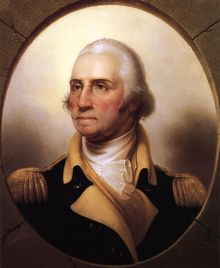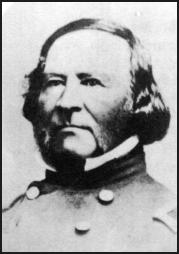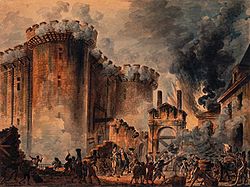1789
| Millennium: | 2nd millennium |
|---|---|
| Centuries: | 17th century – 18th century – 19th century |
| Decades: | 1750s 1760s 1770s – 1780s – 1790s 1800s 1810s |
| Years: | 1786 1787 1788 – 1789 – 1790 1791 1792 |
| 1789 in topic: |
| Subjects: Archaeology – Architecture – |
| Art – Literature (Poetry) – Music – Science |
| Countries: |
| Leaders: State leaders – Colonial governors |
| Category: Establishments – Disestablishments |
| Births – Deaths – Works |
Year 1789 (MDCCLXXXIX) was a common year starting on Thursday (link will display the full calendar) of the Gregorian calendar (or a common year starting on Monday of the 11-day slower Julian calendar).
Contents |
Events of 1789
January–June
- January 7 – 1789 United States presidential elections and House of Representatives elections are held.
- January 21 – The first American novel, The Power of Sympathy or the Triumph of Nature Founded in Truth, is printed in Boston, Massachusetts.
- January 23 – Georgetown University is founded in Washington, D.C., becoming the first Catholic college in the United States.

- February 4 – George Washington is unanimously elected the first President of the United States by the United States Electoral College.
- February 12 – Ethan Allen, Commander of the Green Mountain Boys during the capture of Ft. Ticonderoga and Vermont statesman, dies on his farm in Burlington, Vermont.
- March 4 – At Federal Hall in New York City, the 1st United States Congress meets and declares the new United States Constitution to be in effect.
- March 18 – The last burning at the stake takes place at Newgate when Catherine (or Christian) Murphy is executed for high treason coining.
- April 1 – At Federal Hall, the United States House of Representatives attains its first quorum and elects Frederick Muhlenberg of Pennsylvania as its first Speaker of the House.
- April 7 – Selim III (1789–1807) succeeds Abd-ul-Hamid I (1773–1789) as Ottoman Sultan .
- April 28 – Mutiny on the Bounty: Fletcher Christian leads the mutiny on HMS Bounty against Captain William Bligh.
- April 30 – George Washington is inaugurated at Federal Hall in New York City, beginning his term as the first President of the United States.
- May 5 – In France, the Estates-General convenes for the first time in 175 years.
- June 14 – Bounty mutiny survivors, including Captain William Bligh and 18 others, reach Timor after a nearly 4,000-mile (6,400 km) journey in an open boat.
- June 17 – In France, representatives of the Third Estate at the Estates-General declare themselves the National Assembly.
- June 20 – Tennis Court Oath is made in Versailles.
- June 23 – Louis XVI of France makes a conciliatory speech urging reforms to a joint session and orders the three estates to meet together.
July–December
- July – An estimated 150,000 of Paris's 600,000 people are without work.
- July 9
- In Versailles, the National Assembly reconstitutes itself as the National Constituent Assembly and begins preparations for a French constitution.
- The Theater War officially ends.
- July 10 – Alexander Mackenzie reaches Mackenzie River Delta.
- July 11 – The King of France fires popular Chief Minister Necker.
- July 12 – An angry Parisian crowd demonstrates against the King’s decision to dismiss Minister Necker.
- July 13 – The people begin to seize arms for the defense of Paris.
- July 14 – The French Revolution (1789–1799) begins: Citizens of Paris storm the Bastille and free seven prisoners. In rural areas, peasants attack noble manors.
- July 27 – The first U.S. federal government agency under the new Constitution, the Department of Foreign Affairs (later renamed the Department of State), is established.
- August 4 – In France, members of the Constituent Assembly take an oath to end feudalism and abandon their privileges.
- August 7 – The United States Department of War is established.[1]
- August 26 – The Declaration of the Rights of Man is proclaimed in France.
- August 28 – William Herschel discovers Enceladus, one of Saturn's moons.
- September 2 – The United States Department of the Treasury is founded.
- September 15 – Department of State
- September 22 – Russo-Turkish War, 1787-1792 – Battle of Rymnik: Alexander Suvorov roundly defeats 100,000 Turks.
- September 24 – The Judiciary Act of 1789 establishes the federal judiciary and the United States Marshals Service.[2]
- September 25 – The United States Congress proposes a set of 12 amendments for ratification by the states. Ratification for 10 of these proposals is completed on December 5, 1791, creating the United States Bill of Rights.
- September 29 – The U.S. Department of War establishes the nation's first regular army, with a strength of several hundred men.
- October – Some 7,000 women march 12 miles (19 km) from Paris to Versailles to demand action.
- November 6 – Pope Pius VI appoints John Carroll the first Roman Catholic bishop in the United States.
- November 20 – New Jersey ratifies the United States Bill of Rights, the first state to do so.
- November 21 – North Carolina ratifies the United States Constitution and becomes the 12th U.S. state.
- November 26 – A national Thanksgiving Day is observed in the United States as recommended by President George Washington and approved by Congress.
- December 11 – The University of North Carolina, the oldest public university in the United States, is founded.
- December 23 – A leaflet circulated in France accuses marquis de Favras of plotting to rescue the royal family.
Undated
- Thomas Jefferson returns from Europe, bringing the first macaroni machine to the United States.
- Influenced by Dr. Benjamin Rush's argument against the excessive use of alcohol, about 200 farmers in a Connecticut community form a temperance association.
- Joseph II, Holy Roman Emperor, decrees that all peasant labor obligations be converted into cash payments.
- Fort Washington is built in Cincinnati, Ohio, to protect early U.S. settlements in the Northwest Territory.
Ongoing
- Russo-Swedish War (1788–1790)
- Russo-Turkish War (1787–1792)
Births

Brigadier General René Edward De Russy.
| Gregorian calendar | 1789 MDCCLXXXIX |
| Ab urbe condita | 2542 |
| Armenian calendar | 1238 ԹՎ ՌՄԼԸ |
| Bahá'í calendar | -55 – -54 |
| Bengali calendar | 1196 |
| Berber calendar | 2739 |
| Buddhist calendar | 2333 |
| Burmese calendar | 1151 |
| Byzantine calendar | 7297 – 7298 |
| Chinese calendar | 戊申年十二月初六日 (4425/4485-12-6) — to —
己酉年十一月十五日(4426/4486-11-15) |
| Coptic calendar | 1505 – 1506 |
| Ethiopian calendar | 1781 – 1782 |
| Hebrew calendar | 5549 – 5550 |
| Hindu calendars | |
| - Bikram Samwat | 1845 – 1846 |
| - Shaka Samvat | 1711 – 1712 |
| - Kali Yuga | 4890 – 4891 |
| Holocene calendar | 11789 |
| Iranian calendar | 1167 – 1168 |
| Islamic calendar | 1203 – 1204 |
| Japanese calendar | Tenmei 9Kansei 1 (寛政元年) |
| Korean calendar | 4122 |
| Thai solar calendar | 2332 |
- January 4 – Benjamin Lundy, American abolitionist (d. 1839)
- January 12 – Ettore Perrone di San Martino, prime minister of Sardinia (d. 1849)
- January 21 – William Machin Stairs, Canadian businessman and statesman (d. 1865)
- February 22 – René Edward De Russy, Brigadier General of the United States Army, Superintendent of the United States Military Academy, and military engineer (d. 1865)
- March 16 – Georg Ohm, German physicist (d. 1854)
- May 1 – George Fife Angas, Founder of South Australia (d. 1879)
- July 19 – John Martin, English painter (d. 1854)
- August 21 – Augustin Louis Cauchy, French mathematician (d. 1857)
- August 28 – Stephanie de Beauharnais, Grand Duchess of Baden (d. 1860)
- September 15 – James Fenimore Cooper, American writer (d. 1851)
- October 8 – William John Swainson an English naturalist and artist (d. 1855)
- December 15 – Edward B Dudley, North Carolina governor
- December 28 – Catharine Sedgwick, American writer (d. 1867)
- date unknown – Mohammad Ibrahim Zauq, Urdu poet (d. 1854)
- Friedrich List, German journalist (d. 1846)
Deaths
- January 1 – Fletcher Norton, 1st Baron Grantley, English politician (b. 1716)
- January 8 – Jack Broughton, English boxer (b. 1703)
- January 23 – Frances Brooke, English writer (b. 1724)
- February 19 – Nicholas Van Dyke, American lawyer and President of Delaware (b. 1738)
- April 7 – Abd-ul-Hamid I, Ottoman Sultan (b. 1725)
- April 7 – Petrus Camper, Dutch anatomist (b. 1722)
- April 26 – Count Petr Ivanovich Panin, Russian soldier (b. 1721)
- May 9 – Jean Baptiste Vaquette de Gribeauval, French artillery specialist (b. 1715)
- May 25 – Anders Dahl, Swedish botanist (b. 1751)
- June 4 – Prince Louis-Joseph of France, son of Louis XVI of France (tuberculosis) (b. 1781)
- July 13 – Victor de Riqueti, marquis de Mirabeau, French economist (b. 1715)
- July 14 – Jacques de Flesselles, French provost (assassinated) (b. 1721)
- July 15 – Jacques Duphly, French composer (b. 1715)
- July 22 – Joseph-François Foulon, French politician (executed) (b. 1715)
- July 30 – Giovanna Bonanno, Italian poisoner and alleged witch
- October 27 – John Cook, American farmer and President of Delaware (b. 1730)
- December 3 – Claude Joseph Vernet, French painter (b. 1714)
- December 12 – John Ponsonby, Irish politician (b. 1713)
- December 23 – Charles-Michel de l'Épée, French philanthropist and developer of signed French (b. 1712)
References
- ↑ [1]
- ↑ "The First Supreme Court". History.com. http://www.history.com/this-day-in-history.do?action=VideoArticle&id=5371. Retrieved 2008-09-24.

